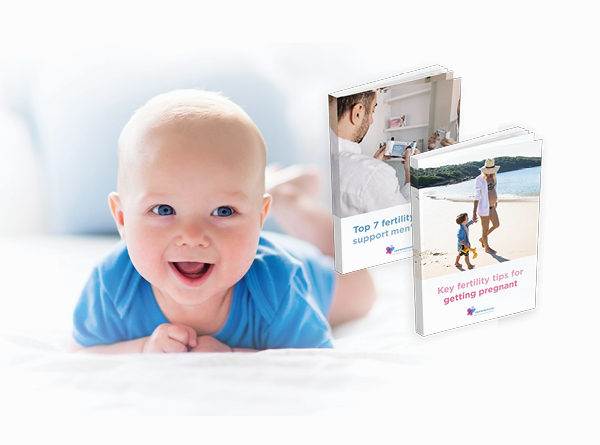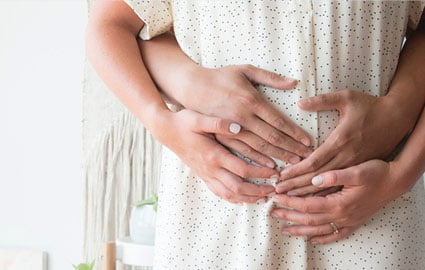A positive pregnancy test result doesn’t just mean coming to terms with the incredible experience that is parenthood, it also signals the start of (technically) ten months of physical and emotional change as your body accommodates for a growing human.
The pregnancy journey is challenging, emotional, beautiful, strange and amazing all at once! While there are many apps and sites out there that detail the pregnancy stages by week, for a clearer, simplified overview it’s ideal to look at the pregnancy stages as three trimesters. Here’s a breakdown of the stages of pregnancy and what to expect when you’re expecting!
Trimester 1 - weeks 1-12
Because it is generally difficult to pinpoint the exact time of conception, pregnancy starts from the first day of your last period. From the time the egg is fertilised (around week 3), your hormones start to change as your body preps to make room for a tiny human to grow.
It’s definitely early days, but incredibly by the end of the first trimester, your baby’s major organs have formed and arms, legs, fingers and toes have appeared, as well as their facial features.
Here are some of the common occurrences during this first trimester:
- Morning sickness: as there are so many rapid hormonal changes in the body, it’s quite common for pregnant women to feel nauseous, dizzy and even vomit. Up to 80% of women experience symptoms of morning sickness in the early stages of pregnancy - which, despite the name, doesn’t necessarily only occur in the morning. One in five women will also experience morning sickness in the second trimester, with some experiencing it through all stages of pregnancy.
While there isn’t a cure for morning sickness, it’s advised that women experiencing it stay away from foods that trigger their nausea, and to eat small meals often, rather than larger less frequent meals. Keeping your fluids up is also important as vomiting can cause dehydration. Some women also find flat lemonade or ginger ale can help to settle their stomachs!
- Breast tenderness: One of the earliest physical changes you’ll notice is that your breasts will start to get bigger, with your nipples becoming larger and darker.
- Fatigue - all the time: Your body is working hard to produce more blood, and your blood sugar levels and blood pressure may also be lower. Further to this, the hormonal changes in your body include an increase of progesterone, which makes you feel sleepy. Keep up a healthy, balanced diet, get plenty of sleep and rest at other periods during the day if you need to.
- Food cravings: Many pregnant women may not actually crave a particular food, but feel hungrier in general. You might find that you suddenly crave certain foods or are suddenly turned off a food you usually enjoy. Food cravings are perfectly normal but if you feel you’ve developed a taste for odd things, it’s best to double check with your doctor.
Trimester 2 - weeks 13-28
When do you start showing when pregnant? For most women, the time has arrived! Weeks 13 to 28 are often referred to as the ‘honeymoon period’, as it’s the time when morning sickness subsides for most women, and energy levels bounce back - hello, pregnancy glow! During this trimester you may also really start to feel your baby moving around - though some women can feel it as early as about 16 weeks, particularly if they’re having their second child.
Here are some other changes you may start to experience:
-
- Heartburn and constipation: during pregnancy your digestive system slows down to allow for more time for your body to absorb food. As such, it’s common to experience heartburn and constipation. To minimise the effects, try to eat smaller meals with high-fibre foods more frequently, and ask your doctor for any recommended antacids that are safe to use during pregnancy.
- A need to urinate more frequently: with your body fluids increased and your uterus increasingly pressing against your bladder as baby grows, you’ll find that you’ll want to use the bathroom more often.
- Signs of your pregnancy belly: by week 13 baby will have grown to the size of a lemon - for many new mums, the 3 months pregnant belly is when things start to really seem real, as you can actually see your belly growing. Of course, if you’ve had a child before or are carrying multiples, it’s likely that you’ll be showing earlier.
Trimester 3 - week 27 to birth
This final countdown starts from week 27 until you give birth, which generally occurs between weeks 39 to 42. Your baby grows quite quickly in these final few months and prepares to get into position for birth, so it’s natural for you to feel tired and more around more slowly than you usually do. As you make final preparations for baby it’s important to allow yourself time to rest as much as you can. Here are some things you might experience during the home stretch:
-
- Back pain: during your pregnancy you produce more of the hormone relaxin, which causes the joints in your pelvic area to loosen to prepare for delivery, and your growing belly also means your centre of gravity shifts forward. As such, your lower back curves to accommodate, which can cause pain. Get plenty of rest and ensure you have adequate back support when you sit.
- Swollen feet, hands and face: more body fluid and more pressure on your uterus can mean that your feet, hands and face may appear swollen. Prop your feet up whenever you can!
-
- Leaking colostrum: your nipples may start to leak colostrum, which is the liquid nutrients your baby receives before breast milk comes in. It’s a good idea to start wearing breast pads to protect your bras and clothes.
- Braxton-Hicks contractions: these are weak contractions that feel more like cramping or tightening in your abdomen, and are quite irregular. If you feel the contractions are strong and at regular intervals, it’s best to contact your doctor as it could be a sign of early labour.
Trimester 4 - life post-birth
The first three months of your baby’s life are an important adjusting period for both you and bub, as so are commonly considered as a fourth trimester. If you’ve delivered naturally, you may still experience vaginal bleeding for a number of weeks after birth, and if you’ve given birth by cesarean you’ll need to rest your body well. You may also experience cramping as your uterus shrinks back to its original size.
This is an important time to practice self-care to help adjust yourself to life as a parent: gentle movement when you feel up to it, resting whenever you can and being kind to your body as it recovers from pregnancy.
https://www.healthdirect.gov.au/morning-sickness
https://www.whattoexpect.com/wom/pregnancy/the-6-most-uncomfortable-third-trimester-symptoms.aspx
https://www.elevit.com.au/pregnant/my-body/
https://www.ncbi.nlm.nih.gov/pmc/articles/PMC3856209/
Your pregnancy journey
Preparing for pregnancy
A good preconception plan to educate yourself about your fertility cycle and implementing recommended lifestyle changes optimises your chances of conceiving naturally.
Monitoring ovulation
In order to pinpoint your fertile window, you need to be aware of the length of your menstrual cycle. The average length of menstruation is 28 days.
During pregnancy
The female body will evolve dramatically within this time and there are many nutritional and lifestyle changes that will be necessary to meet the needs of a growing healthy foetus.
Download your FREE e-books for top fertility tips to help you get pregnant





